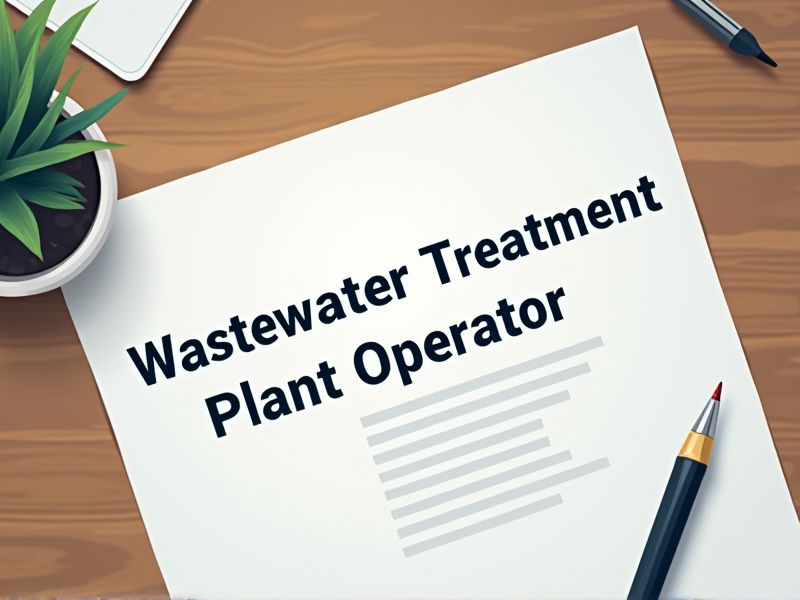
Wastewater Treatment Plant Operators must ensure the safe and efficient management of water resources, necessitating specific certifications for adherence to industry standards. These certifications validate an operator's knowledge in handling treatment processes, maintaining equipment, and ensuring regulatory compliance. Certification serves as a safeguard, minimizing potential environmental hazards and public health risks. Essential certifications for Wastewater Treatment Plant Operators include those listed below.
Class I Wastewater Treatment Plant Operator License
A Class I Wastewater Treatment Plant Operator License ensures that operators have the foundational skills and knowledge necessary for maintaining safe and efficient treatment processes. This certification helps in minimizing pollution risks by verifying that operators understand state regulations and environmental standards. It plays a crucial role in protecting public health by ensuring that wastewater is properly managed and discharged. Having a licensed operator can prevent costly fines and legal issues associated with environmental compliance violations.
Class II Wastewater Treatment Plant Operator License
The Class II Wastewater Treatment Plant Operator License ensures operators have the necessary skills and knowledge to manage more complex treatment processes efficiently. Without this certification, operators may not meet regulatory requirements, potentially leading to non-compliance penalties. The license validates an operator's capability to maintain public health and environmental safety by effectively treating wastewater. Employers often mandate this certification to reassure stakeholders of the plant's operational proficiency.
Class III Wastewater Treatment Plant Operator License
A Class III Wastewater Treatment Plant Operator License demonstrates advanced proficiency in managing complex wastewater systems with enhanced process knowledge. It is often required because more sophisticated plants involve intricate equipment and can face critical environmental challenges. Regulations demand operators possess higher-level qualifications to ensure facilities meet strict state and federal environmental standards. Holding this license boosts trust among public officials and community members, reflecting a commitment to health and environmental safety.
HAZWOPER Certification
HAZWOPER Certification is necessary for Wastewater Treatment Plant Operators because it ensures they are properly trained to manage and respond to hazardous substance releases. OSHA mandates this certification to minimize health risks associated with exposure to dangerous chemicals present in wastewater facilities. Proper training through HAZWOPER enhances the plant operators' ability to implement safety protocols effectively during emergencies. The certification ensures compliance with federal regulations, reducing legal liabilities for the facility.
OSHA 10-Hour Safety Certification
OSHA 10-Hour Safety Certification enhances safety awareness, reducing the likelihood of accidents in wastewater treatment plants. Operators frequently encounter hazardous environments, and this certification equips them with crucial knowledge to handle such risks effectively. Regulatory compliance demands that operators adhere to safety standards, and obtaining the certification demonstrates this commitment. Acquiring the certification can also lead to improved operational efficiency by fostering a culture of safety within the facility.
Confined Space Entry Certification
Confined space entry certification is necessary for wastewater treatment plant operators because it ensures they understand the specific hazards associated with restricted environments, such as toxic gases or limited oxygen. In these spaces, operators face significant risks that mandate specialized training for both worker safety and regulatory compliance. The certification process equips operators with the skills to assess and control dangers, reducing potential injury or fatality incidents. Without proper certification, operational efficiency and safety protocols could be compromised, leading to serious environmental and health consequences.
SCADA Systems Operator Certification
SCADA systems monitor and control complex wastewater treatment processes; certification ensures operators have the necessary technical skills. Certified operators are better equipped to identify and resolve system malfunctions, preventing environmental contamination. Regulatory compliance often requires certified personnel to demonstrate competency and adherence to industry standards. Certification can lead to improved operational efficiency, reducing costs and enhancing the safety of wastewater treatment operations.
Process Control & Instrumentation Certification
Wastewater treatment plant operators benefit from process control and instrumentation certification because it enhances their ability to maintain consistent and optimal plant performance, reducing environmental impact. Certification ensures operators are proficient in using advanced technologies that automate monitoring and adjustments, improving efficiency. Proper training in instrumentation aids in the early detection of system irregularities, preventing costly breakdowns. Knowledge gained through certification contributes to compliance with regulatory standards, ensuring public and ecosystem safety.
EPA Compliance & Environmental Management Certification
Regulatory requirements mandate that a Wastewater Treatment Plant Operator holds an EPA Compliance & Environmental Management Certification to ensure adherence to federal and state environmental laws. This certification empowers operators with the necessary knowledge to effectively manage and mitigate potential environmental risks associated with waste treatment processes. Without proper certification, operators may inadvertently cause harmful discharge into ecosystems, resulting in legal repercussions and ecological damage. Certification also enhances operational efficiency, leading to improved resource management and reduced operational costs.
First Aid/CPR Certification
Wastewater treatment plant operators often work in environments with potential hazards, such as exposure to harmful chemicals and heavy machinery, which increases the risk of accidents. First Aid/CPR certification equips them with the skills to respond promptly to injuries or medical emergencies, minimizing harm. Quick intervention through certified personnel can reduce workplace fatalities by efficiently managing incidents until professional help arrives. Regulatory bodies and safety standards frequently require certification to ensure a safe working environment and compliance with industry regulations.
Summary
As a reader pursuing wastewater treatment certifications, you'll likely enhance operational knowledge and technical skills. Certified operators often experience increased job prospects and career advancement opportunities. Achieving certification usually leads to improved compliance with environmental regulations. Treatment plants benefit from efficient operations, reducing operational costs and environmental impact.
